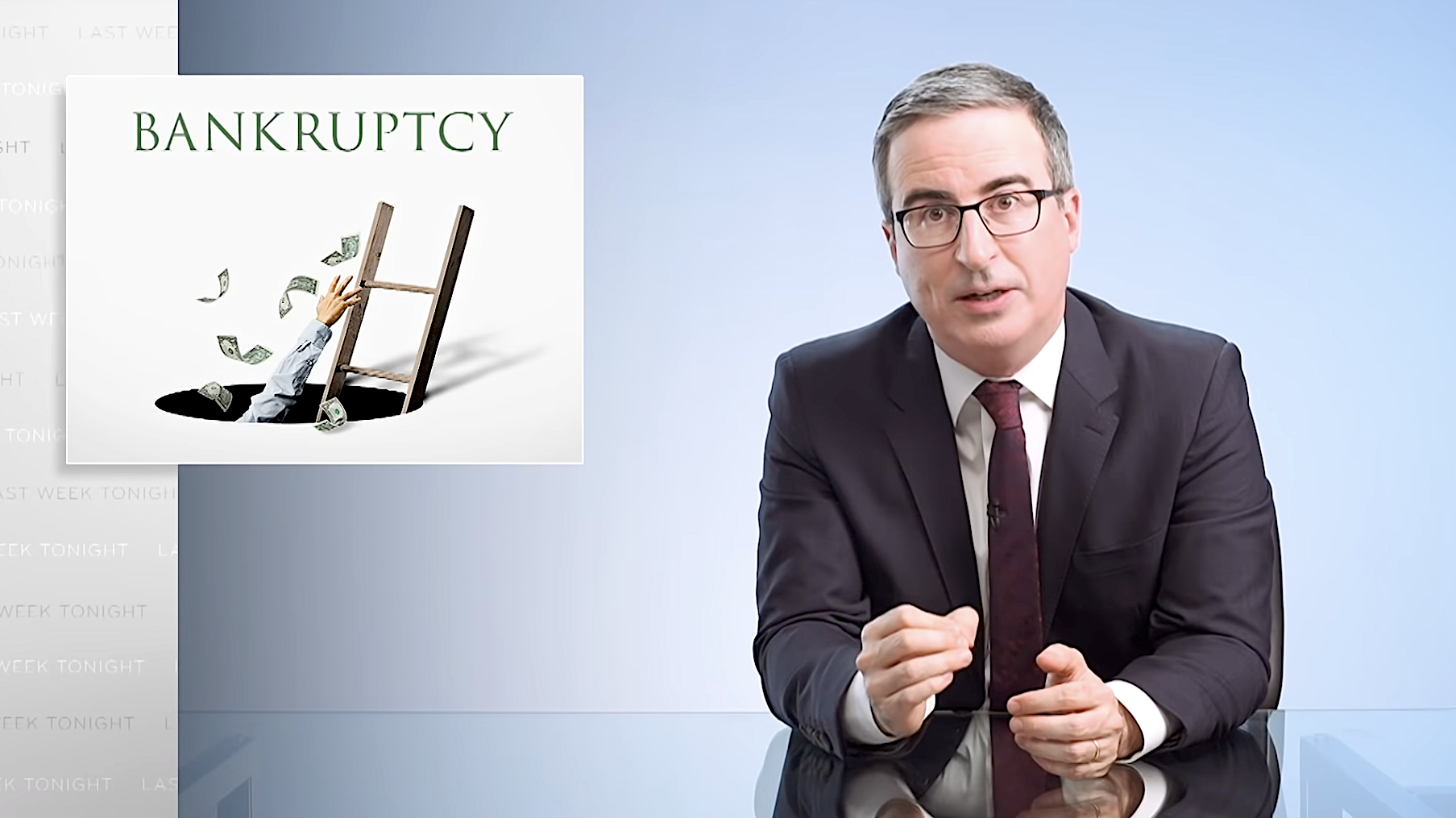John Oliver explains personal bankruptcy, how credit card lobbyists and lawyers make it much worse


A free daily email with the biggest news stories of the day – and the best features from TheWeek.com
You are now subscribed
Your newsletter sign-up was successful
Bankruptcy, especially as portrayed by bankruptcy lawyers, promises "a fresh start from your debts," John Oliver said on Sunday's Last Week Tonight. Between 800,000 and 1.5 million Americans file for bankruptcy each year, "and many worry that once the current pandemic assistance stops, more and more people will need the type of help" bankruptcy offers. The process gives people a chance to dig out from under a mountain of debt, but it does hit your credit score, and it carries a "completely misguided" social stigma, he said.
"Bankruptcy is not solely caused by bad decisions, it's often caused by bad luck — unavoidable challenges like job loss, divorce, surprise medical bills, or perhaps even, you know, a once-in-a-century global pandemic," Oliver said. But absurdly, "a lot of people can't afford to go bankrupt," quite literally.
"Our modern bankruptcy code was enacted in 1978 — interestingly, around the same time that the credit card industry began to enjoy a period of steady deregulation," Oliver said. That "worked out very well for them, because they marketed themselves aggressively, and during this time, consumer debt began to sharply rise. And what the industry clearly wanted was people stuck in a lucrative cycle of minimum payments, late fees, and interest hikes. What they didn't want spoiling that was people cutting the cycle short through bankruptcy."
The Week
Escape your echo chamber. Get the facts behind the news, plus analysis from multiple perspectives.

Sign up for The Week's Free Newsletters
From our morning news briefing to a weekly Good News Newsletter, get the best of The Week delivered directly to your inbox.
From our morning news briefing to a weekly Good News Newsletter, get the best of The Week delivered directly to your inbox.
The credit card industry lobbied Congress aggressively, and a 2005 law made it harder and more expensive to file for personal bankruptcy, Oliver said. He explained the two kinds of personal bankruptcy, Chapter 7 and Chapter 13, and noted that many lawyers steer clients to the more expensive option, Chapter 13 — especially if their clients are black. "Even bankruptcy discriminates against Black people," Oliver sighed. He illuminated why people might have to file for bankruptcy twice — not, as Suze Orman suggests, "recklessness" or "moral failing" — and blamed "much of what is wrong with our current bankruptcy system" on the 2005 overhaul.
If you paid attention to the 2020 Democratic primaries, you already know President Biden was a big backer of the 2005 law and clashed with Sen. Elizabeth Warren (D-Mass.) over it — and if you weren't paying attention. Oliver offered a recap. Warren now has an overhaul bill that Biden broadly supports, but it is unlikely to pass if 10 Republicans need to sign on to thwart a filibuster, he said. Oliver closed with a NSFW animated summation of his argument that also pillories mandatory credit counseling. Watch below. Peter Weber

A free daily email with the biggest news stories of the day – and the best features from TheWeek.com
Peter has worked as a news and culture writer and editor at The Week since the site's launch in 2008. He covers politics, world affairs, religion and cultural currents. His journalism career began as a copy editor at a financial newswire and has included editorial positions at The New York Times Magazine, Facts on File, and Oregon State University.
-
 Samurai: a ‘blockbuster’ display of Japanese heritage
Samurai: a ‘blockbuster’ display of Japanese heritageThe Week Recommends British Museum show offers a ‘scintillating journey’ through ‘a world of gore, power and artistic beauty’
-
 BMW iX3: a ‘revolution’ for the German car brand
BMW iX3: a ‘revolution’ for the German car brandThe Week Recommends The electric SUV promises a ‘great balance between ride comfort and driving fun’
-
 Munich Security Conference: a showdown between Europe and Trump?
Munich Security Conference: a showdown between Europe and Trump?Today’s Big Question Report suggests European leaders believe they can no longer rely on the US for military support – but decoupling is easier said than done
-
 TikTok secures deal to remain in US
TikTok secures deal to remain in USSpeed Read ByteDance will form a US version of the popular video-sharing platform
-
 Unemployment rate ticks up amid fall job losses
Unemployment rate ticks up amid fall job lossesSpeed Read Data released by the Commerce Department indicates ‘one of the weakest American labor markets in years’
-
 US mints final penny after 232-year run
US mints final penny after 232-year runSpeed Read Production of the one-cent coin has ended
-
 Warner Bros. explores sale amid Paramount bids
Warner Bros. explores sale amid Paramount bidsSpeed Read The media giant, home to HBO and DC Studios, has received interest from multiple buying parties
-
 Gold tops $4K per ounce, signaling financial unease
Gold tops $4K per ounce, signaling financial uneaseSpeed Read Investors are worried about President Donald Trump’s trade war
-
 Electronic Arts to go private in record $55B deal
Electronic Arts to go private in record $55B dealspeed read The video game giant is behind ‘The Sims’ and ‘Madden NFL’
-
 New York court tosses Trump's $500M fraud fine
New York court tosses Trump's $500M fraud fineSpeed Read A divided appeals court threw out a hefty penalty against President Trump for fraudulently inflating his wealth
-
 Trump said to seek government stake in Intel
Trump said to seek government stake in IntelSpeed Read The president and Intel CEO Lip-Bu Tan reportedly discussed the proposal at a recent meeting
